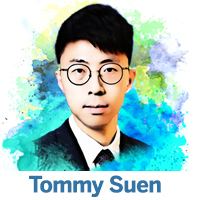In order to protect the territorial integrity of China from the threat posed by die-hard “Taiwan independence” separatists, the Chinese authorities have recently issued a set of guidelines on meting out criminal punishments to those separatists, including the death penalty as a deterrence of the last resort. The authorities have also spelled out clearly defined circumstances in which “Taiwan independence” separatists shall be held criminally responsible for their lifetimes.

 The die-hard “Taiwan independence” separatists will dig their own graves if they refuse to surrender their secessionist spades. To mitigate the harshness of the sentencing regime, a clemency-based immunity mechanism has been incorporated into the guidelines. The guidelines stress that if die-hard separatists voluntarily drop their “Taiwan independence” hat, stop committing separatist activities and take measures to mitigate or undo the harm or prevent the spread of the damage, they may have their cases dismissed or be exempted from prosecution.
The die-hard “Taiwan independence” separatists will dig their own graves if they refuse to surrender their secessionist spades. To mitigate the harshness of the sentencing regime, a clemency-based immunity mechanism has been incorporated into the guidelines. The guidelines stress that if die-hard separatists voluntarily drop their “Taiwan independence” hat, stop committing separatist activities and take measures to mitigate or undo the harm or prevent the spread of the damage, they may have their cases dismissed or be exempted from prosecution.
In the following discussion, we will provide brief facts to support the view of China’s Foreign Minister Wang Yi that “all ‘Taiwan independence’ separatists will be nailed to the pillar of shame in history”. Our discussion will focus on the separatist and criminal deeds of Taiwan’s newly elected regional leader, Lai Ching-te; his deputy, Hsiao Bi-khim; and the island’s so-called “representative to Japan”, Hsieh Chang-ting. While the central government is on the right side of history, these three separatists are definitely on the wrong side of history.
READ MORE: Cross-Taiwan Strait integration best way to maintain peace
Time is also on the side of the central government. With the passage of time, the growing economic, political and cultural power of the Chinese mainland is likely to make the unification process increasingly irresistible and unstoppable. With the utmost sincerity, the central government will eventually win the hearts and minds of Taiwan compatriots. Our think tank believes that more and more Taiwan compatriots will soon be inspired by a common belief in a rejuvenation of the Chinese nation.
Lai is every inch a die-hard “Taiwan independence” separatist. He demonstrated a stronger separatist undertone than his predecessors in his inaugural speech, not only selling hard his separatist ideas but also attempting to internationalize the Taiwan question
Lai is every inch a die-hard “Taiwan independence” separatist. He demonstrated a stronger separatist undertone than his predecessors in his inaugural speech, not only selling hard his separatist ideas but also attempting to internationalize the Taiwan question.
Hsiao is also a die-hard separatist, who keeps courting foreign intervention to derail China’s national reunification. With strong connections with American lawmakers, she has vowed to keep working hard to invite US intervention. During her three-year stint in Washington as the island’s “representative” in the US, Taiwan-US unofficial relations were boosted to an all-time high (Hong Kong Free Press). In particular, she was eager to strengthen the military ties between Taiwan and the US. Besides, she attempts to persuade the European Union to sign an economic partnership agreement with Taiwan Island, raising the concern that it may operate to the detriment of the one-China principle in Europe. The central authorities imposed sanctions on Hsiao in 2022 and 2023, meaning that she and her family members cannot enter the Chinese mainland, Hong Kong or Macao.
It is worth noting that a few Democratic Progressive Party politicians maintained personal ties with Hong Kong’s political leaders in the early 2010s. For example, after visiting the mainland in 2012, Hsieh attended a high-profile forum in the city in 2013, prompting analysts to speculate that it would pave the way for future dialogue between the DPP and the central government. Former Hong Kong Special Administrative Region chief executive Tung Chee-hwa said Hong Kong was willing to be a bridge across the Strait. But relations between the DPP and Hong Kong deteriorated rapidly in late 2019. After taking the post of Taiwan’s “representative” in Japan, Hsieh adopted a pro-Japan policy, actively seeking Japanese support to resist China’s national reunification process. Hsieh has been peddling the weird idea that Taiwan is protected by “three sacred mountains”, referring to the island’s central mountains, Taiwan Semiconductor Manufacturing Company, and democracy.
READ MORE: US urged to work with China for cross-Strait peace, stability
Die-hard “Taiwan independence” separatists have never been less than a threat to China’s national interests, but they have recently become more evil by successfully stoking up geopolitical rivalry in the region to a latently combustible level. In addition to the above-mentioned judicial guidelines to punish the die-hard “Taiwan independence” separatists, a lot more can and needs to be done to isolate these dangerous separatists from Taiwan compatriots.
Tommy Suen is a community services officer of BPA Eastern District, a director of youth development affairs of Chinese Dream Think Tank, and an administrative manager and researcher of the P&P Research Institute.
Kacee Ting Wong is a barrister, a part-time researcher of Shenzhen University Hong Kong and Macao Basic Law Research Center, chairman of Chinese Dream Think Tank, and a district councilor.
The views do not necessarily reflect those of China Daily.


